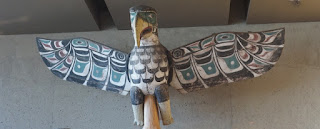We liked some: Emily Carr (very big in Canada) reminded us of young Georgia O'Keefe (but, being Canadian, rather more into dark forests). A touch of theosophy inherited from her teacher may explain the tendency of some of her pictures to look as if we were seeing just the wrapping around something. The pictures were counterpointed with a series by a Chinese painter, Lui Shou Kwan, which we preferred.
And, though I can imagine our sullen Swedish Canadian's response, I liked the anime and manga influenced irreverence and exuberent silliness of Takashi Murakami.
The Museum of Vancouver was almost a history of protest: Chinese immigrants; Japanese interned in WW2; women wanting education, jobs, the vote; opposition to big freeways; hippies; feminism; gay rights and even neon signs.
But eventually there is always acceptance or compromise. The First Nations have gone to court over their lost lands but are adamant they aren't trying to take back ownership - just a degree of stewardship to ensure burial sites and sacred places aren't abused.
Today we visited Stanley Park and walked back on the path beside the wintery beach.
Two people were swimming (it's 4°C) and several kids played. People jogged . The park benches have the usual dedications, some silly, some personal, some, well, Canadian: "sit here, share", "see from my perspective", "enjoy what they enjoyed".
From the small bit of Canada we've seen, and from what we've heard of the country generally, there is a quiet respect for others, openness, politeness, and being prepared to help and contribute.
Canadian people are just NICE. I don't know how often we've stopped to look at a map and someone has asked if we needed help. On buses passengers frequently get up for us and nonchalently nod at the vacated seat, offering it to us. Buying tickets for a play and not having enough cash, we were told we could take the tickets and pay later. In cafes people automatically take back plates having scraped left overs into a 'composting' bin, and put plastic into recycling. And so on.
It's not Utopia, there are people sleeping rough and in the city centre people do walk past them as they do everywhere. In Kitsilano one local homeless man has a tent on the sidewalk - some people stop and talk, the duvet in it's plastic wrapping is presumably a gift. Two other men have made a 'den' by an empty shop. They don't seem to be hassled and sit in the shop doorway chatting amiably. We've yet to see a police officer anywhere in Vancouver.
Tomorrow we go home to a land of snow and occasional minor earthquakes. In some ways we're looking forward to being back but long holidays are unsettling. They make you homeless. The wheel's still in spin and there's no telling who that it's naming. We always ask each other: could we live here? what would be lost? what would be gained? Today, near the end of our walk, we sat in the warmth of Granville Market (once a fish market, now just about everything and every sort of food you can imagine) and relaxed, Eleanor with a sophisticated Iced Mocha, me with a banana and strawberry milkshake. "Could we live here?" I asked. Unfortunately we fail to meet the strict niceness criteria insisted upon by the Immigration Department so it has to be "No".
But we'll remember.
See you all soon.















